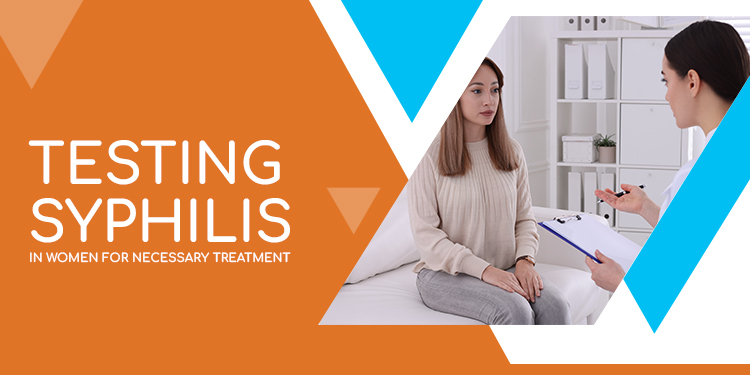- Suite 17, 117A Harley Street London, W1G 6AT
- 020 34751653
- Monday - Friday
9:00 - 18:00 - Saturday - Sunday
10:00 - 14:00

Syphilis is a sexually transmitted infection with the bacteria Treponema pallidum. The bacteria may infect the anus or genitals and can also infect the lips and mouth.
Syphilis can be treated easily. But untreated, the infection may cause permanent damage and may even be deadly.
Testing is the first lines of defence against spreading syphilis and will be the initial step toward getting treatment.
Read this blog post to know about syphilis and how to test for Syphilis in women.
Syphilis infections usually develop in stages that will have different symptoms.
In Syphilis, the primary stage of infection is usually characterised by the appearance of sores, called chancres, on the infected areas. These sores appear round and firm, sometimes wet and open, but they are not painful.
This is the highly infectious stage of the disease. Sores are very contagious, particularly when they are open, enabling easy transmission through sexual contact. They may be ignored as being pimples, harmless bumps or ingrowing hairs. Sores can be in places that are difficult to see such as deep in the labia or in the folds of the foreskin in men.
Syphilis is spread through anal and vaginal sex. Transmission through oral sex is less common but still possible. A mother can spread syphilis to her baby during pregnancy or birth. Syphilis cannot spread through casual contact like holding hands, hugging, sneezing or coughing.
Sores usually appear between three weeks to three months after the initial exposure and may remain for three to six weeks, after which they will resolve. However the fact that the sores have gone doesn’t mean the infection has resolved.
During the secondary stage, Syphilis may become evident in the form of a skin rash that starts on the trunk before spreading to other body parts. This can include the soles of your feet and palms of your hands. The rashes will not be painful or itchy. Some people may develop wart-like sores in their genital area and mouth. Other symptoms may include flu-like symptoms such as – sore throat, fever, muscle aches and fatigue.
This stage will generally last for two to six weeks before subsiding but it may return within two years.
If left untreated, Syphilis will remain in your body. There will be latent periods and periods where symptoms are present, again. Some people with syphilis who do not have treatment will risk progression into the later stage. In the late stage of Syphilis, infection can spread to other body parts and cause severe damage such as blindness, tumours, paralysis and other problems with the nervous system.
Though medication will treat the infection at this stage, it cannot reverse any damage that has been caused.
Though it is easy to treat a Syphilis infection, many people do not know they have it until it is been present for some time. Unlike other diseases, you may not have any symptoms so having a test will be the only way to be sure.
The positive news is that you can test for syphilis at any point, whether you have sores or any other symptoms. The testing requires a blood sample to test for the presence of syphilis antibodies, which may determine past or present infections.
The doctor can test your cerebrospinal fluid by means of a procedure called ‘lumbar puncture’ or ‘spinal tap’. This will help identify if the infection has spread to your nervous system, and to what extent. This procedure however, is invasive and uncomfortable, hence the importance of early testing and treatment.
Syphilis is easily treated, particularly in its early stages. The doctor will administer antibiotics, typically in the form of an injection, to clear the infection completely from your nervous system. The antibiotics are usually of the penicillin family, but there are alternatives if you are allergic or cannot take penicillin.
Some things to consider when having treatment:
After treatment it is advisable that you practice safe sex and use a condom or other forms of protection. Make sure you and your partner get tested every year. The sooner you test for Syphilis, the sooner you will be able to start the treatment.
Visit our clinic and get tested for women here. Our doctors will suggest treatment so that you do not get any STIs.
Call us at 020 34751653 to discuss your sexual health problems.
Our Sexual Health Clinic is located on Harley Street in the heart of London.
We are only a 5 minutes walk from Regents Park station, 10 minutes from Great Portland Street and 15 minutes from Oxford Circus.